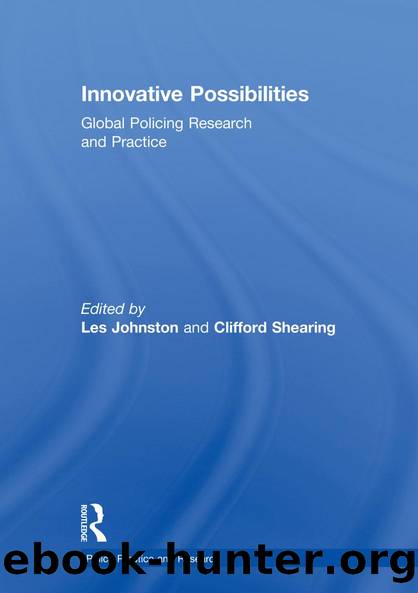Innovative Possibilities: Global Policing Research and Practice by Les Johnston Clifford Shearing

Author:Les Johnston, Clifford Shearing [Les Johnston, Clifford Shearing]
Language: eng
Format: epub
ISBN: 9780415618359
Barnesnoble:
Goodreads: 11272808
Publisher: Routledge
Published: 2011-02-14T00:00:00+00:00
Obstacles to reform in Latin America
Most analysts agree that the main obstacle to reform is political. According to Hinton, who analyzed police reform efforts in Argentina and Brazil, most reforms clash with the lack of vertical and horizontal accountability that is typical of societies with high inequality with regard to income. Civil society lacks the necessary cohesion to mobilize mechanisms of vertical accountability, which could result in sustainable police reform programs. Civic associations tend to be weak and their defense of human rights policies is often attacked by tough-on-crime politicians. On the other hand, excessive concentration of power on the executive branch and the lack of checks and balances undermine the formation of pro-reform coalitions. In Hintonâs view, the confrontational style of politics that exists in Latin American politics, which leads to constant competition and threats to undermine the opposition, diminishes the will of reformers to risk the political consequences of meaningful reform (Hinton, 2006). However, the question is whether Hintonâs analysis is applicable to all countries in the region, given that some of them have, in recent years, undertaken fiscal and economic reforms, diminished the powers and influence of their armed forces, and begun carrying out new social and educational programs. What is it that makes police reform such a unique and difficult task?
Ungar (2008) states that the first type of obstacle to reform is a political one, given that changes to established practices usually clash with the interests of police forces that do not want to see their powers reduced. On a broader level, police reforms are usually undermined by political pressures to crack down on crime, which is one of the most important national concerns throughout the region. Opposition by the police is not a minor concern, as it can affect public order and weaken the stability of executive authorities in office. However, many of the reform processes were launched as a consequence of the discrediting of the police. Thus, their internal opposition to reform process can usually be managed by civilian authorities. Political pressures to crack down on crime are more difficult to overcome, and in a number of countries they have strengthened the hand of opponents to democratic policing. Fear of crime often leads to punitive legal reforms, an increase in the prison population, and more tolerance of police misconduct (Cruz, 2005). All this usually translates into opposition to reforms that are often viewed as soft on crime.
Frühling has defined a set of conditions that indicate a very high possibility that comprehensive police reform can be successful. The absence of one or more of these conditions usually indicates that the process will face problems. The first condition is the existence of adequate governance of public security. This means public security policies are stable and designed by properly trained civil servants, and their content is democratic. The second condition is that law enforcement institutions are engaged in the reform process, both because there is a nucleus of officers who support reform, and also because the police have the institutional capabilities to design, implement, and evaluate these reforms.
Download
This site does not store any files on its server. We only index and link to content provided by other sites. Please contact the content providers to delete copyright contents if any and email us, we'll remove relevant links or contents immediately.
Collaborating with Parents for Early School Success : The Achieving-Behaving-Caring Program by Stephanie H. McConaughy; Pam Kay; Julie A. Welkowitz; Kim Hewitt; Martha D. Fitzgerald(899)
Entrepreneurship Education and Training: The Issue of Effectiveness by Colette Henry Frances Hill Claire Leitch(666)
Adding Value to Policy Analysis and Advice by Claudia Scott; Karen Baehler(499)
Materializing the Middle Passage by Jane Webster;(497)
Race and American Political Development by unknow(490)
Sociological Perspectives of Health and Illness by Constantinos N. Phellas(479)
American Government and Politics Today by Steffen W. Schmidt Mack C. Shelley Barbara A. Bardes(477)
Human and Global Security : An Exploration of Terms by Peter Stoett(473)
Control Of Oil - Hardback by Kayal(468)
Advances in Child Development and Behavior, Volume 37 by Patricia J. Bauer(403)
The Disappearance of Rituals: A Topology of the Present by Byung-Chul Han(401)
The Catholic Church and European State Formation, AD 1000-1500 by Jørgen Møller(395)
The World According to China by Elizabeth C. Economy(387)
Theories of Counseling and Psychotherapy: A Case Approach by Nancy L. Murdock(381)
Left Is Not Woke by Susan Neiman(371)
Application of classical statistics, logratio transformation and multifractal approaches to delineate geochemical anomalies in the Zarshuran gold district, NW Iran by unknow(365)
Cross-Cultural Child Development for Social Workers by Lena Robinson(358)
Turkey's Relations with the West and the Turkic Republics: The Rise and Fall of the Turkish Model by Idris Bal(353)
Japan's Ainu Minority in Tokyo by Mark K. Watson(341)
